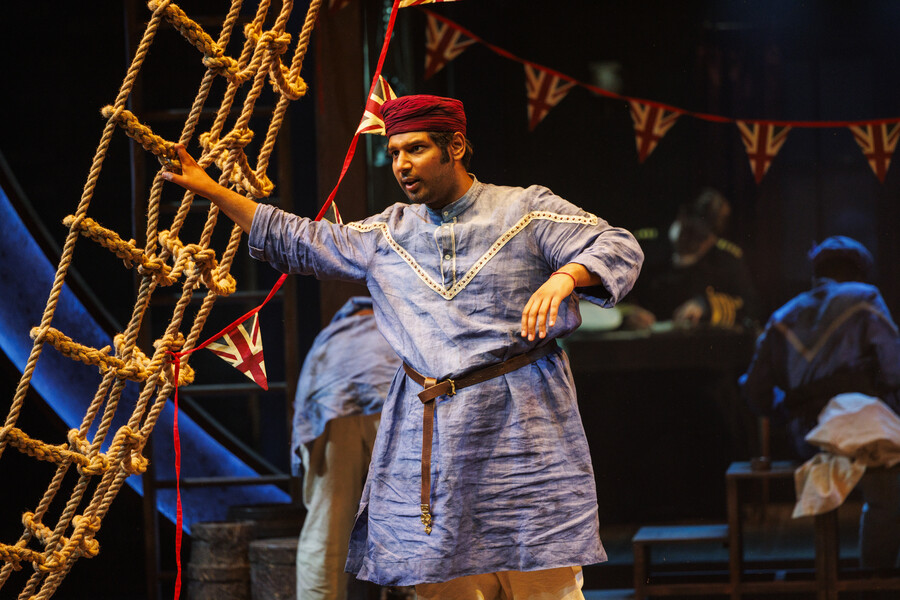
Culture Writer Hannah Dalgliesh reviews the RSC’s production of The Empress, finding it to be an important play about the lost stories of Indians in Britain during the British Empire.
Content warning: This review makes reference to racism and sexual assault.
The outline of a ship on stage, ropes hanging on either side, and opening with song: four people make their way to Britain for the first time. Tanika Gupta’s play is ambitious: it charts the real-life stories of Abdul Karim (Raj Bajaj), who was the Munshi to Queen Victoria (Alexandra Gilbreath), and the first Indian MP, Dadabhai Naoroji (Simon Rivers), as well as the fictional stories of Hari (Aaron Gill), a lascar (sailor), and Rani Das (Tanya Katyal), a young ayah (nursemaid). When they reach the shore, each are forced their separate ways. Rani is cruelly dismissed by the family who had promised her employment, and finds herself lost and alone in London. Katyal’s portrayal of Rani Das is excellent: she is expressive and gracious in her movements and in her speech. With no surviving accounts of ayahs in Britain, Rani is an important reimagining of what young Indian women suffered on their arrival and in their following employment.
With no surviving accounts of ayahs in Britain, Rani is an important reimagining of what young Indian women suffered on their arrival and in their following employment
As the story lines diverge, it is clear that the unusual friendship blossoming between the Queen and Abdul Karim is the standout. Gilbreath’s performance of Queen Victoria is flawless: every intonation, every moment and glance to Lady Sarah or indeed to the audience feels effortlessly authentic. The set puts Queen Victoria and all her attendees on the raised stage above the main stage, a choice grounded in clear hierarchy. It is not until significantly later in the play that she is brought down to the lower ground.
There are genuinely moving moments between the two of them. Queen Victoria’s receiving of Karim’s gift of a spice box is at once humorous and touching. Without doubt the most beautiful moment with her is when she asks Karim to describe the Taj Mahal on an early morning to her, and at once the stage fills with music, dancers, spices, and colourful fabrics; we are immersed in India as a homeland, not as a colonial asset but as the country it rightfully should be where people are free. It is a celebration of culture, past and present. The Queen is moved to tears when Karim describes how British soldiers have destroyed so much of the land.
Rani’s story moves at a vastly different pace: she finds new employment and suffers abuse greatly at the hands of a seemingly kind household. It was hard not to feel that the subject of rape and abuse was not dealt with enough when it occurred, although this did change in the second act which was good to see.
The stage fills with music, dancers, spices, and colourful fabrics; we are immersed in India as a homeland, not as a colonial asset
Certainly, the music and the set of the performance was excellent, and the change in tone and pace in the second half made for very good theatre. At times the script felt it lacked the lyricism and subtlety it could have offered: the dialogue and descriptions were very much on the surface rather than allowing the audience to ask any kind of questions of themselves. However, it remained at all times an important play about colonial power and the stories which have been lost because of it.
The later focus on Dadabhai Naoroji’s role as the first Indian MP, elected in 1892, was fascinating given how little he is represented within stories of politics and politicians. The blending of fact and fiction did very well to make his story a key link between the plight of destitute Rani and the steady relationship between Queen Victoria and Abdul Karim.
The script succeeded in giving voice to the racism Karim suffered at the hands of the majority of the Royal family, especially in refusing to use his name, calling him only ‘The Indian,’ and the burning of all correspondence he had received from the Queen as ordered by Edward VII. Overall, this was an excellent, ambitious production with fantastic acting which seizes on the importance of telling stories forgotten and ignored in Britain’s colonial history.
Rating: 4/5
Enjoyed this? Read more from Redbrick Culture here!
Theatre Review: As You Like It

Comments